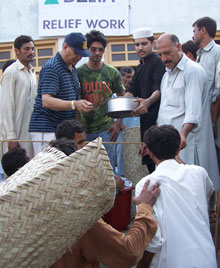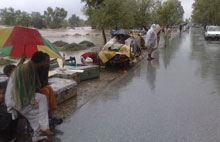By Ryan Hyland
Rotary International News — 24 August 2010
Rotarians are reaching out to victims of the heavy monsoon rains in Pakistan, as the country continues to cope with its worst flooding in decades.
Major rivers have flooded valleys in about one-third of the country, claiming as many as 1,600 lives and washing away bridges, roads, and entire villages. The United Nations estimates that more than four million people have been left homeless.
“The people of Pakistan were not prepared for a disaster like this to reach this magnitude. Each day it seemed to get worse,” says Shehzad Ahmed, governor of District 3272 (Afghanistan; Pakistan). “It’s difficult for me to imagine how we’re going to cope with this situation.”
Millions of children face diarrhea, cholera, and upper respiratory infections from contaminated water and insects. Eight million people are still in urgent need of humanitarian aid. The UN predicts that the economic cost of the floods could reach billions of dollars.
“While most Rotarians in my district weren’t terribly affected, we still have a moral obligation to help those who are suffering,” Ahmed says. He adds that clubs in his district are collecting food, safe drinking water, and medicine.
Ahmed also formed a district disaster relief committee of past district governors, governors-elect, and governors-nominee, as well as other leaders, to oversee long-term recovery efforts.
“We’ve received tremendous support so far from clubs and districts all over the world,” he says. “Rotarians are motivating each other and their friends to contribute generously toward this noble cause.”
Relief efforts
In response to the floods, The Rotary Foundation Board of Trustees is accepting contributions to help fund Rotary projects that will support long-term disaster recovery in the affected areas. Learn more.
Ahmed’s district is also coordinating with ShelterBox, a grassroots disaster relief organization supported by Rotary clubs around the world, to help distribute emergency aid. ShelterBox is sending 5,000 water filtration units and 2,500 water containers to flooded areas. More than 1,900 tents and 600 ShelterBox containers have already been deployed.
The Rotary Club of Sharpstown (Houston), Texas, USA, filled two 40-foot shipping containers with relief supplies, and is coordinating with Ahmed’s district and District 3271 to deliver them to Karachi, where local clubs will help distribute the goods.
Meanwhile, the Rotary Club of Multan Metropolitan, Punjab, has established five flood relief camps at local hospitals. Club members are collecting tents, household items, food, and medicine.
World Water Works, a Rotary-club sponsored relief organization that provides disaster victims with water purification tools, has sent more than 600 boxes to the southern province of Sindh.
Hugo Pike, chair of World Water Works and a member of the Rotary Club of Chelwood Bridge, Avon, England, says each box contains a water purification kit that can supply each member of a family of four with about 2 quarts of drinking water every day for a year.
“It is likely that this emergency will continue for some weeks,” Pike says. “But Rotary clubs in District 1200 are ready to respond.”
Syed Shahab Balkhi, governor of District 3271, says Rotary clubs can do the most good by planning for the rehabilitation of flooded areas.
“This is unprecedented flooding and has been incredibly widespread,” Balkhi says. “Long-term recovery will be acute and painful. But help has been promised by every club in my district and District 3272.”
L:Volunteers hand out food and other aid to victims of the flooding in Pakistan. R:Pakistanis living on the side of the road after heavy flooding. Photos courtesy of Rotary Club of Rawalpindi Rohtas













